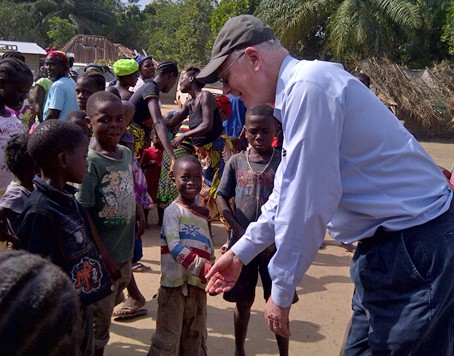
During a recent visit to Liberia, a team including USAID’s Global Water Coordinator Christian Holmes had a first-hand opportunity to see sustainability in action. The team visited two forest communities in Bong County, about a five-hour drive from Monrovia. The communities survive on subsistence agriculture. With assistance from USAID’s Integrated Water, Sanitation, and Hygiene (iWASH), both communities have achieved open defecation free status.
The team, comprised of representatives of the Government of Liberia, iWASH staff, and USAID officials, were impressed by the caliber of the latrines and some of the imaginative, effective approaches the community took to adjust latrine construction to meet their needs.
USAID’s iWASH is a 5-year $10 million program managed by Global Communities with the support of Population Services International. The Program seeks to help local communities reach open defecation free status, support entrepreneurs to provide goods and services needed for both clean water and sanitation, and strengthen the overall capacity of the government of Liberia to develop and manage water and sanitation programs.
Over the life of the project, iWASH seeks to reach approximately 100,000 people with access to improved drinking water and 95,000 people with access to improved sanitation. A core focus of the program is sustainability.
To increase water access, USAID is not just paying contractors to fix wells and pumps. Through iWASH, USAID is training local entrepreneurs to fix them and to market their services to communities in the future. The Program is also supporting community-level management structures to maintain water points and undertake repairs, all while working through existing country systems to build capacity for supportive services, such as water quality monitoring.
To increase sustainable sanitation access, iWASH is, again, not just paying contractors to build latrines. USAID is mobilizing local leaders to change norms and behaviors at the community level (i.e., eliminating open defecation), strengthening existing country-owned systems for hygiene promotion, and promoting latrine designs using locally-sourced materials that can be built without external support.
iWASH provides recognition to “natural leaders,” community leaders who take the responsibility for helping communities reach open defecation free status. The program helps these community leaders become "WASH entrepreneurs.” Under iWASH, if a natural leader is able to bring two communities to open defecation free status, then the natural leader qualifies to become an iWASH-supported WASH entrepreneur. Under the WASH entrepreneur program, USAID provides some financial assistance to help entrepreneurs sell WASH-related products, such as water disinfectant, and teaches entrepreneurs how to make WASH related products such as soap for subsequent sale. One of the enthusiastic WASH entrepreneurs noted that the entrepreneurs should consider coming together to form a company that could seek contracts and grants to support WASH-related work.







Comment
Make a general inquiry or suggest an improvement.